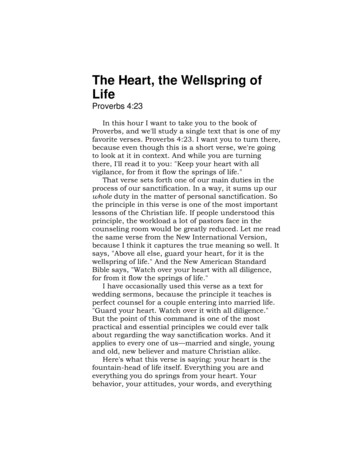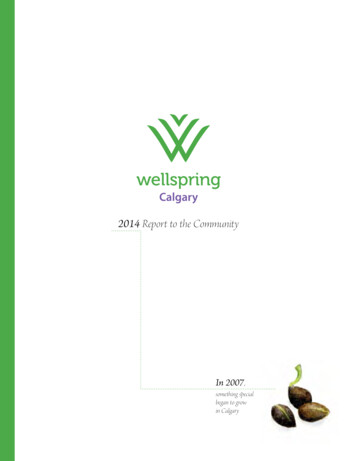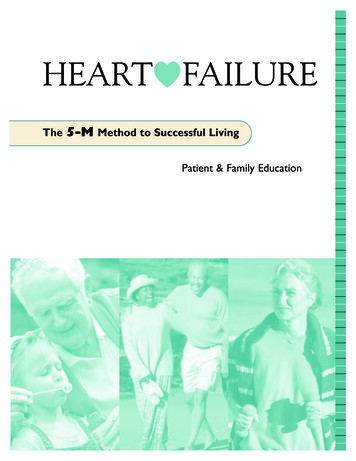
Transcription
The Heart, the Wellspring ofLifeProverbs 4:23In this hour I want to take you to the book ofProverbs, and we'll study a single text that is one of myfavorite verses. Proverbs 4:23. I want you to turn there,because even though this is a short verse, we're goingto look at it in context. And while you are turningthere, I'll read it to you: "Keep your heart with allvigilance, for from it flow the springs of life."That verse sets forth one of our main duties in theprocess of our sanctification. In a way, it sums up ourwhole duty in the matter of personal sanctification. Sothe principle in this verse is one of the most importantlessons of the Christian life. If people understood thisprinciple, the workload a lot of pastors face in thecounseling room would be greatly reduced. Let me readthe same verse from the New International Version,because I think it captures the true meaning so well. Itsays, "Above all else, guard your heart, for it is thewellspring of life." And the New American StandardBible says, "Watch over your heart with all diligence,for from it flow the springs of life."I have occasionally used this verse as a text forwedding sermons, because the principle it teaches isperfect counsel for a couple entering into married life."Guard your heart. Watch over it with all diligence."But the point of this command is one of the mostpractical and essential principles we could ever talkabout regarding the way sanctification works. And itapplies to every one of us—married and single, youngand old, new believer and mature Christian alike.Here's what this verse is saying: your heart is thefountain-head of life itself. Everything you are andeverything you do springs from your heart. Yourbehavior, your attitudes, your words, and everything
Proverbs 4:23that colors your character flows from your innerperson. So you need to protect your heart with alldiligence—to keep it from becoming dry and empty,poisoned and polluted, or stagnant and bitter. Becauseif your heart is wrong, everything else in your life willshow the effects of it. If your heart is full of garbage,that's what's going to come out in your words andbehavior. So above all else, guard your heart.When I first moved to Southern California twentyone years ago, one of the first features on the lanscapethat stood our to me was a very large concrete flumethat runs down the hillside on Interstate 5, just beforeyou get to the 14 freeway intersection. The first time Isaw it I was riding with John MacArthur, and I jokedthat it was the biggest water-slide I had ever seen. Andhe explained what it was: it's water brought down fromNorthern California. It flows for miles in a concreteaqueduct that brings it downstate, channels it up overthe mountains and over that flume, where it emptiesinto the reservoir you can see on the other side of thatfreeway. And from there it supplies half of the SanFernando Valley with water. That single source of wateris essential to keep more than a million people alive.And because of the terrorist threat, the reservoir isconstantly kept under careful guard. It is kept full andfresh. It is regularly tested for poisons and pollutants.And it is carefully protected against every conceivableattack, because it is so vital to the life and well-being ofour community.The writer of this proverb is saying that your heartis the reservoir of your life, and the state of your heartdetermines everything about your character. Of course,he isn't speaking of the literal blood-pumping organthat we know as the heart. But the "heart" spoken ofhere is that innermost part of our soul that is the seatof our intellect, our emotions, and our will.I spokelast Sunday night in our main service about thespirituality of God, and one of the lessons Jesus drew2
The Heart, the Wellspring of Lifefrom that truth is that true worship should stem fromthe spirit of man—from our innermost person; from ourheart, not just our lips. And Jesus' exact words were"God is spirit, and those who worship him mustworship in spirit and truth." So I stressed the fact thattrue worship is about truth—not just raw emotion andmindless sentimentality. It's not the sort of irrational,hand-waving, feelings-based passion people today tendto associate with worship; it engages the entire heart—mind, emotions, and will.And a guy came up to me after the service saying hewas totally confused, because he couldn't reconcile theideas of heart and mind. He thought of those twothings as opposites—with the mind being the seat ofrational thought, and the heart being the seat ofirrational emotions. I'm afraid a lot of people think inthose terms. They imagine that the heart is somethingirrational and full of raw passion; and the mind isrational and somehow unspiritual. That's contrary tothe way Scripture uses those terms. But in the Bible,the heart is virtually equivalent to the mind. The heartis that spiritual, hidden person who thinks and feelsand wills—the spirit of the person as distinct from thebody.And our text recognizes this. It's saying that all ourenergies, our thoughts, our passions, our appetites,our behavior, and ultimately our character derive theirsource from this hidden fountain and centralreservoir—that innermost part of the human soul—which Scripture so often refers to as the heart.The heart is not distinct from the mind. When theBible uses this expression "the heart," it's neverexcludes the intellect or the mind. Again, whenScripture speaks of the heart, the mind—theintellectual faculty—is often precisely what Scripturemeans to signify. In Hebrew terminology, your heart iswhere your thoughts originate, and your stomach iswhere you emotions come from. As a matter of fact, the3
Proverbs 4:23normal Hebrew expression for the emotions was theword may-aw, which meant bowels, or intestines. Itreferred to the fact that strong emotions are often feltby a tightening sensation in the abdomen. So you haveexpressions in the King James Version like "bowels ofcompassion," and in 2 Corinthians 6:12, Paul writes tothe church at Corinth, "Ye are not straitened in us, butye are straitened in your own bowels." That is a literalrendering of the Greek expression. What he meant wasthat the Corinthians were withholding their affectionsfrom him, so he used a Greek word that referred to theabdomen, or the intestines, because that is the part ofthe body Hebrews associated with the emotions. TheESV translates it this way: "You are not restricted byus, but you are restricted in your own affections." Youare tightening your abdomens against us.But "the heart" is what Scripture associatesprimarily with the thought life. And that is also easy toprove from Scripture. The heart is where our thoughtscome from. Proverbs 23:7: "as [a man] thinks in hisheart, so is he." Psalm 53:1, "The fool says in his heart,'There is no God.'" Hebrews 4:12 speaks of "thethoughts and intentions of the heart." Jesus said to thescribes in Matthew 9:4: "Why do you think evil in yourhearts?" So when Scripture speaks of "the heart," it'stalking about the seat of your thought life. The heart isto the intellect what the abdomen is to the emotions.Now, sometimes in Scripture emotions are alsoassociated with the heart, but never in a way thateliminates the mind. The heart is never contrasted withthe intellect. In the Bible, joy, fear, gladness, andsorrow are all associated with the heart. But Scripturenever treats those feelings—or any other legitimateemotion—as something separate from the intellect. Joyand gladness, fear and sorrow are all emotions thatcolor our thoughts; and those emotions themselvesstem from the mind. That's why they are associated4
The Heart, the Wellspring of Lifewith the heart—the thought life; the imagination; theway you think.So don't ever think of the heart as somethingdistinct from the mind. The mind simply manifests inthought-form what is in your heart. And likewise, youremotions color the thoughts of your heart. So the heartis the wellspring from which all your thoughts and allyour feelings and all your actions ultimately come. Thatis exactly what this verse is teaching. So be sure thatyou understand exactly what Scripture means by theheart, it is the innermost part of your soul—the core ofyour personality—and it is often used virtually as asynonym for the thought life.Now I hope you have turned to Proverbs 4, because Iwant to read enough of this passage to give you the fullcontext. The writer (and I believe this is most likelySolomon) is outlining the principles of wisdom. And heinserts a long admonition, beginning with verse 20,urging us to pay careful heed to what he is saying. I'llstart reading in Proverbs 4:20, and I'll read through theend of the chapter:My son, be attentive to my words; inclineyour ear to my sayings.21 Let them not escape from your sight;keep them within your heart.22 For they are life to those who find them,and healing to all their flesh.23 Keep your heart with all vigilance, forfrom it flow the springs of life.24 Put away from you crooked speech, andput devious talk far from you.25 Let your eyes look directly forward, andyour gaze be straight before you.26 Ponder the path of your feet; then allyour ways will be sure.27 Do not swerve to the right or to the left;turn your foot away from evil.5
Proverbs 4:23Now, notice: in that short passage of Proverbs, the sageis telling us how to guard our hearts. He sets forthseveral practical ways we can safeguard our hearts—byfixing the eyes of our soul on good; by setting the focusof our soul on truth; by removing the feet of our soulfrom the pathway of evil, and above all by riveting thethoughts of our soul on the godly wisdom of Scripture.So all the verses I just read are closely related to verse23, which is the key to this passage, and all of themtogether teach us how to guard our hearts, to keep theheart sound and upright, because the heart is thereservoir that supplies the vitality and the character oflife itself. That's the central point, and that is theprinciple I want to look at this morning.So here are some ways you need to guard yourheart, and I'll divide them into three categories to makeit easy for you to remember. Try to take these down; I'llmake it easy, and there are only three of them. First:1. KEEP YOUR HEART FRESH AND PURE.What good is it for the city water supply to be fullunless it is also pure? I once stayed in a place in Indiathat drew water from a large local well. And for severaldays people had been complaining about the taste ofthe water, so they sent a man to look into the well tofind out if it had been contaminated. It was a massivehole in the ground big enough to put a mini-van in it,and shallow enough that the workman could climbdown with a ladder and some wading boots. And it wasringed by a short concrete wall to keep people fromfalling in by accident. So this guy went down to seewhat he could find. After a few minutes he tossed upout of the well the carcass of a rotting cat.And when I looked into the well, the stench thatcame out of it nearly knocked me over. The water in thewell was overgrown with water-lilies, and it was thehome of hundreds of frogs and lizards and watersnakes and water-bugs. For a minute I comforted6
The Heart, the Wellspring of Lifemyself with a reminder that I had been drinking bottledwater all week. But then it occurred to me that all therice I had been eating for days had been boiled in waterthat was drawn from that filthy well. That was probablyfifteen years ago, and it still gives me a creepy feelingjust to think about it.An impure heart is even worse. That is exactly whatJesus taught. Matthew 15:19: "For out of the heartcome evil thoughts, murder, adultery, sexualimmorality, theft, false witness, slander. These arewhat defile a person." A corrupt heart produces evildesires, evil thoughts, evil words, and evil deeds. It'slike a polluted well, and it spoils everything that comesout of it. That is what makes us sin. In fact, Jesus'point was that an impure heart is the only thing thatcan actually defile us spiritually.Did you realize that? Have you ever thought aboutthe fact that what emanates from your own heart is farmore dangerous to you spiritually than all thetemptations and defilement you encounter in theworld? In fact, the sin that assaults you externallywould be no danger at all if there were not sin in yourheart. Nothing you see and nothing that touches youcould defile you spiritually if it were not for the sin inyour heart. Remember that Jesus lived a lifetime in thissinful world, and He was exposed to every temptation.Scripture says "in every respect [He] has been temptedas we are, yet without sin" (Hebrews 4:15). Eventhough He gained a reputation for being a friend tosinners, Hebrews 7:26 says He remained "holy,innocent, unstained, separated from sinners, andexalted above the heavens." He went to their homes formeals; He rubbed shoulders with them and showedthem mercy, but He wasn't defiled by their sin—eventhe worst of sinners.The sin of this world doesn't rub off and defile youfrom the outside. Only what's in your heart can defileyou in that way. James 1:14-15 says, "But each person7
Proverbs 4:23is tempted when he is lured and enticed by his owndesire. Then desire when it has conceived gives birth tosin, and sin when it is fully grown brings forth death."And James 4:1 says, "What causes quarrels and whatcauses fights among you? Is it not this, that your [own]passions are at war within you?" Everything that defilesyou comes from within. You are not sinful because sinrubbed off from the outside and defiled you. The sinthat defiles you all comes from within.Now, it's true that we are tempted by the world andthe devil as well as by our own fleshly desires, butthose things by themselves do not actually defile us.Nothing on the outside can defile you spiritually. Theywould have no defiling effect on us at all if our ownhearts weren't drawn to the evil they tempt us with. Soonly what comes from within you can defile youspiritually. And Jesus taught that principle explicitly.Do you remember that incident recorded in Mark 7when the Pharisees saw the disciples eating their foodwithout washing their hands first? Mark 7:2 says, "theysaw that some of his disciples ate with hands that weredefiled, that is, unwashed." And (verse 5) "the Phariseesand the scribes asked him, 'Why do your disciples notwalk according to the tradition of the elders, but eatwith defiled hands?'"Now it wasn't merely physical hygiene thatconcerned these Scribes and Pharisees. They didn'tunderstand anything about microbiology or germs.That wasn't the issue. But they had a tradition ofwashing for ceremonial reasons. The purpose of theirwashing before meals wasn't for physical hygiene; itwas supposed to cleanse away spiritual defilement—orso they thought. This was a purely human tradition; itwasn't anything the Old Testament law prescribed.There were some ceremonial washings commandedin the Old Testament, of course. You may rememberthat a bronze laver, or washbasin, was part of thefurnishings of the Tabernacle. It was placed between8
The Heart, the Wellspring of Lifethe Tabernacle of the congregation and the altar, andwhenever the priests came to the altar to makesacrifices, they were required to wash first. Listen toExodus 30:18-21:You shall also make a basin of bronze, withits stand of bronze, for washing. You shallput it between the tent of meeting and thealtar, and you shall put water in it,19 with which Aaron and his sons shallwash their hands and their feet.20 When they go into the tent of meeting,or when they come near the altar tominister, to burn a food offering to theLORD, they shall wash with water, so thatthey may not die.21 They shall wash their hands and theirfeet, so that they may not die. It shall be astatute forever to them, even to him and tohis offspring throughout their generations."The law also prescribed ceremonial washings wheneverpeople were ceremonially defiled by contact with deadbodies or other things that were ceremonially unclean.Again, the point wasn't physical hygiene; the washingwas merely symbolic for the cleansing away of spiritualdefilement. It was a ritual that symbolized what weneed spiritually. There was little or no actual antisepticvalue in these washings; in fact, it was just waterwithout soap. But it symbolized the spiritualpurification that was necessary—in the same way thatcircumcision symbolized a kind of spiritual purification.But somewhere along the line, the rabbis decidedthat if one ceremonial washing was good, then twoceremonial washings were better. And so they began tomake rules about when you ought to wash in order tocleanse yourself from spiritual defilement you mightnot even be aware of. And this massive tradition aboutceremonial washing began to dominate people's lives.9
Proverbs 4:23Some of them believed you couldn't even enter ahouse without ceremonial washing. The strictest sectseven taught that you had to wash one hand first beforeit could wash the other. And so there was all thisceremony and ritual attached to the practice ofwashing. You had to go through this elaborate washingceremony before you could eat a meal."What's wrong with that?" you might ask. Well, itwas wrong for two reasons. First of all, it made areligious ceremony of something God hadn't evencommanded. This system of ceremonial washingsepitomized what Jesus meant when he said in Matthew23:4-5 that the Pharisees "They tie up heavy burdens,hard to bear, and lay them on people's shoulders, butthey themselves are not willing to move them with theirfinger. They do all their deeds to be seen by others."And that was the second reason all these ceremonialwashings were wrong. It was all for show. Theceremony of washing externalized something that wasmeant to be internal and spiritual. They took aspiritual symbol and tried to make the ritual itselfefficacious for purification. They had confused physicaldefilement with spiritual defilement, and it made themforget that what they needed to labor to keep pure wastheir heart, not their hands. Germs on the handscannot defile you spiritually. It's the wickedness in yourheart, not the dirt on your hands, that renders youunfit for the kingdom of heaven. Ceremonial defilementis just that: it's symbolic; it's ceremonial. It is not realspiritual defilement. Spiritual defilement comes fromwithin.And so when the scribes and Pharisees criticized thedisciples for eating with unwashed hands, JesusHimself seized the opportunity to teach this lesson.Mark 7:15. He said: "There is nothing outside a personthat by going into him can defile him, but the thingsthat come out of a person are what defile him."10
The Heart, the Wellspring of LifeLater, He went on to explain privately to Hisdisciples:whatever goes into a person from outsidecannot defile him,19 since it enters not his heart but hisstomach, and is expelled?" (Thus hedeclared all foods clean.)20 And he said, "What comes out of aperson is what defiles him. [And here is theparallel passage to the statement fromMatthew I quoted earlier:]21 For from within, out of the heart ofman, come evil thoughts, sexualimmorality, theft, murder, adultery,22 coveting, wickedness, deceit, sensuality,envy, slander, pride, foolishness.23 All these evil things come from within,and they defile a person."Listen, if you want to keep your life pure, you mustguard the purity of your heart. I have some friends whoare neat freaks. One of my friends carries a little bottleof Purell with him, and he always washes his handsbefore every meal. Nothing wrong with that. It's whatour mothers teach us to do, and it's a good way to wardoff germs. But if you want to be spiritually pure, youhave to exercise a different kind of diligence to keepyour heart pure.How do you do that? Romans 13:14: "put on theLord Jesus Christ, and make no provision for the flesh,to gratify its desires." Romans 12:2: "be transformed bythe renewal of your mind." Hebrews 10:22: "draw near[to God] with a true heart in full assurance of faith,with our hearts sprinkled clean from an evilconscience."Keep your heart pure by "present[ing] yourselves toGod as those who have been brought from death to life,and your members to God as instruments forrighteousness" (Romans 6:13). Don't fill your heart with11
Proverbs 4:23that which is impure. Don't read books or look atimages that stir unwholesome thought or immoraldesires. Don't let your imagination entertain evilthoughts. Keep your heart pure.This requires diligence, according to our text. Again,it is something you must do. This is your spiritual duty.Philippians 4:8: "whatever is true, whatever ishonorable, whatever is just, whatever is pure, whateveris lovely, whatever is commendable, if there is anyexcellence, if there is anything worthy of praise, thinkabout these things." "Hold fast what is good. Abstainfrom every form of evil" (1 Thessalonians 5:21-22). Andhere's some more practical advice for keeping yourheart pure from 2 Peter 1:5-8:For this very reason, [Peter says, so thatyou can "become partakers of the divinenature {and escape} from the corruptionthat is in the world because of sinfuldesire"—for this very reason] make everyeffort to supplement your faith with virtue,and virtue with knowledge,6 and knowledge with self-control, andself-control with steadfastness, andsteadfastness with godliness,7 and godliness with brotherly affection,and brotherly affection with love.8 For if these qualities are yours and areincreasing, they keep you from beingineffective or unfruitful in the knowledge ofour Lord Jesus Christ.In other words, load your heart with godly virtue, andthe fruit of that virtue is inevitable—because out of theheart flow the springs of life.But if your heart is impure, the fruit of that impuritywill eventually be manifest as well. As Jesus said inMatthew 7:17-18: "every healthy tree bears good fruit,but the diseased tree bears bad fruit. A healthy treecannot bear bad fruit, nor can a diseased tree bear12
The Heart, the Wellspring of Lifegood fruit." It's a simple principle, and it is the key toour sanctification. "Keep your heart with all vigilance"—and above all, keep it fresh and pure.Look at the context of our verse for some practicalclues about how to keep your heart pure. Verse 24:"Put away from you crooked speech, and put devioustalk far from you." Put away a deceitful mouth andperverse lips. Rid your heart and your lips of all lying,and everything that's perverse, and everything that'sunkind. That same principle is echoed in Ephesians4:25: "put away falsehood, [and] let each one of youspeak the truth with his neighbor." Colossians 3:8-9:"But now you must put them all away: anger, wrath,malice, slander, and obscene talk from your mouth. Donot lie to one another, seeing that you have put off theold self with its practices." And 1 Peter 2:1-2: "So putaway all malice and all deceit and hypocrisy and envyand all slander. Like newborn infants, long for the purespiritual milk, that by it you may grow." There's goodadvice for keeping your heart fresh and pure: put offthe old man and put on the new.And then (Proverbs 4:25-27) fix your heart onrighteousness and don't turn aside from it:Let your eyes look directly forward, andyour gaze be straight before you.26 Ponder the path of your feet; then allyour ways will be sure.27 Do not swerve to the right or to the left;turn your foot away from evil.That's how you keep your heart fresh and pureHere's a second way you need to guard your heart.Number 2 in that list of three you are making:13
Proverbs 4:232. KEEP YOUR HEART FULL AND LARGEA reservoir that supplies water for a community isuseless if it goes dry. Likewise with the human heart.You must keep your heart full. Fill it up with goodthings. Make your heart large. Or rather, let the Lordenlarge your heart.Feed on things that edify your soul. Pour into yourheart that which nourishes and satisfies. Keep it full tooverflowing. Keep it full of good and holy things and itwill never go dry.In Psalm 87:7, we find this prayer addressed to God:"All my springs are in you." If God is the wellspring thatsupplies your heart, the reservoir will stay full enough.He'll make sure your cup runs over.By the way, there is no other way to keep your heartfrom becoming dry and empty. People try all kinds ofthings to mask the emptiness of their hearts—theypursue worldly amusements that occupy their time,and they fill their time with entertainments thatdistract their minds, but none of those things can everfill an empty heart. There is only one way to obtainfulness of heart, and it is by tapping into springs ofliving water.Jesus said, "If anyone thirsts, let him come to meand drink. Whoever believes in me, as the Scripturehas said, 'Out of his heart will flow rivers of livingwater" (John 7:37-38). He told the woman at the well inJohn 4:14: "whoever drinks of the water that I will givehim will never be thirsty again. The water that I willgive him will become in him a spring of water wellingup to eternal life." Revelation 22:17, the last, greatinvitation in Scripture, says, "The Spirit and the Bridesay, "Come." And let the one who hears say, "Come."And let the one who is thirsty come; let the one whodesires take the water of life without price."That's the way to have a full heart: Turn from sin,come to Christ for salvation, and then learn to nourishyour heart at the streams of living water. Isaiah 12:2-314
The Heart, the Wellspring of Lifesays, "Behold, God is my salvation; I will trust, and willnot be afraid; for the LORD GOD is my strength and mysong, and he has become my salvation. With joy youwill draw water from the wells of salvation." I like thatexpression: "draw water from the wells of salvation." It'sa never-ending supply, and again, if you do thesethings you shall never be barren or unfruitful. It's asimple principle.What does it mean to draw water out of the wells ofsalvation? I think it means to feed your soul with thetruths of the gospel. Study and meditate on the grace ofGod. Preach the gospel to yourself constantly—reminding yourself of your own sin, your inability toatone for that sin, Christ's atoning work on yourbehalf, and your spiritual union with Him.Romans 8:16-17 says "we are children of God, and ifchildren, then heirs—heirs of God and fellow heirs withChrist." How could our hearts ever be dry or barren ifwe feed on those truths? How could we be smallhearted people?If you continually revisit the foot of the cross, yourheart will be bathed in Christ's love. If you spend timeeach day in His presence, your heart will be full of Hisjoy. If you feed your soul daily through His Word, yourheart will be full of His wisdom. If you humble yourselfbefore the Lord, your heart will be full of His grace,because "God opposes the proud but gives grace to thehumble" (1 Peter 5:5).If you keep your passion for God alive, your heartwill never go dry. It's as simple as that.Be diligent to do it. Fill your heart with good things.Shun those things that tend to make your heart coldand dry. Drink freely from the water of life. If you trulyknow Christ, and love Him, it should not be hard tokeep a full heart.Look again at the context of our verse for anotherpractical way to keep your heart full and large.Proverbs 4:20-22: "My son, be attentive to my words;15
Proverbs 4:23incline your ear to my sayings. Let them not escapefrom your sight; keep them within your heart. For theyare life to those who find them, and healing to all theirflesh." Incline your ear to wisdom, and keep the wordsof godly wisdom in your heart. Memorize and meditateon Scripture, and your heart will never be empty.So you should have this list so far: keep your heartfresh and pure; keep it full and large. Here's a thirdway you need to guard your heart. Number 3 on yourlist:3. KEEP YOUR HEART FLOWING AND ACTIVENotice how frequently Scripture speaks about riversof living water and cups running over. The psalmistwrites these words of praise to God in Psalm 36:9,"with you is the fountain of life." And Proverbs 16:22says, "Understanding is a wellspring of life unto himwho has it." The water of life is always pictured asflowing freely, running over, and springing up. It's not astagnant pool.In fact, the nonstop, free-flowing motion of anystream is one of the things that keeps it fresh and pure.It's what enables the cisterns to be full and large. Sokeep it flowing and active. Give out what you take in.Share it with others.Don't let your heart stagnate, or it will become bitteras the waters of Marah. Let it be "a well of waterspringing up into everlasting life."I already quoted that familiar statement of Jesusfrom John 7:38. Listen to it again: "He who believes inMe, as the Scripture has said, out of his heart will flowrivers of living water." What Scripture was he talkingabout? I think this is one of those places where He hadin mind the general teaching of Scripture and not justa single text. There are several passages in the OldTestament that set forth this principle. Proverbs 10:11says, "The mouth of a righteous man is a well of life."Proverbs 18:4 says, "The words of a man's mouth are16
The Heart, the Wellspring of Lifeas deep waters, and the wellspring of wisdom as aflowing brook." In other words, the water of life and thewellspring of wisdom flow through the believer so thatwe become instruments in God's hands, bringing lifeand salvation to others through the ministry of thegospel. That, at least in part, is what Jesus meantwhen he spoke of the rivers of living water that flowthrough us.But He also means something even more specificthan that. Notice that the apostle John adds thiscommentary after John 7:38. Verse 39 says, "But thisHe spoke concerning the Spirit, whom those believingin Him would receive." In other words, when Jesusspoke of the wellspring of living water, he was speakingof the Holy Spirit, who is so often symbolized in the OldTestament with th
The Heart, the Wellspring of Life Proverbs 4:23 In this hour I want to take you to the book of Proverbs, and we'll study a single text that is one of my favorite verses. Proverbs 4:23. I want you to turn there, because even though this is a short verse, we're going to look at it in context. And while you are turning










